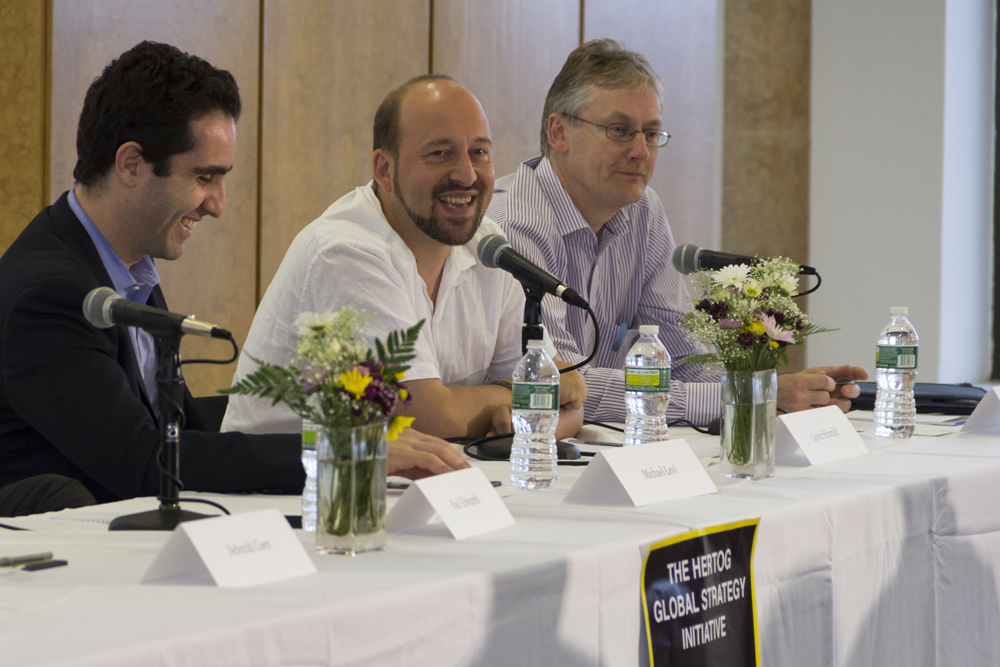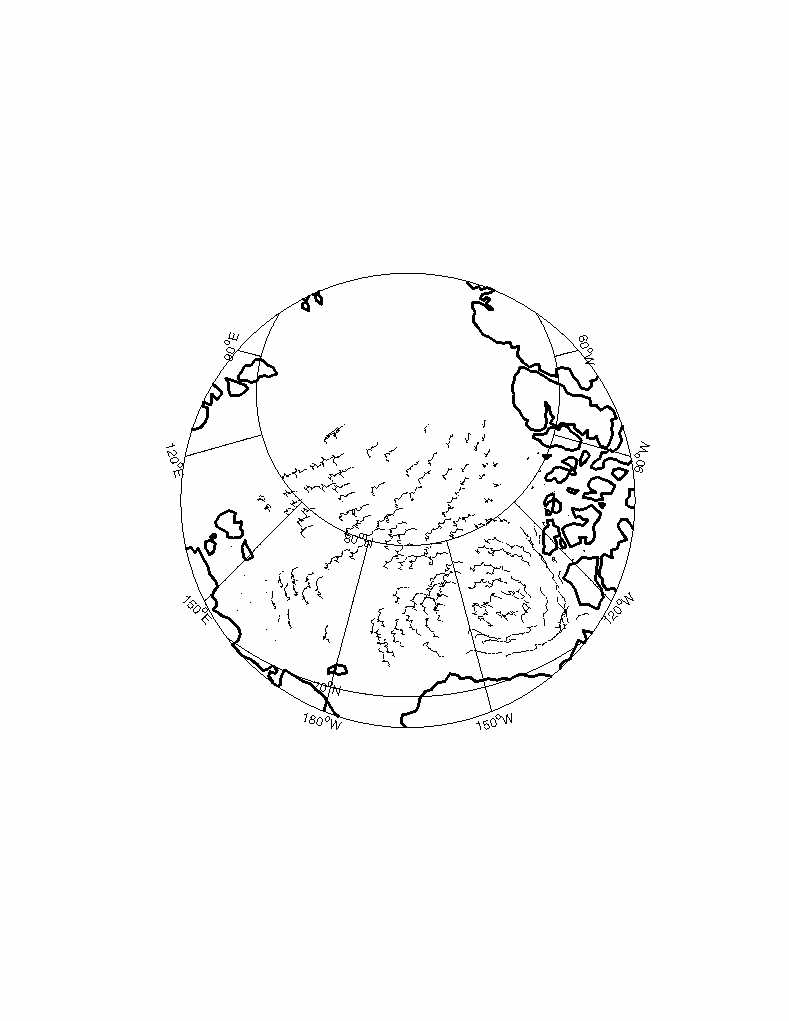I'm at the tip top of the International Affairs Building on the fifteenth floor in a room made of windows, filled with sky. Every summer, the Hertog Global Strategy Initiative brings experts and policy makers to Columbia University for a lecture series. Tonight, I am thrilled to find my old undergraduate research advisor is to be one of the speakers. Right away, he's talking about how he found out that telling people at parties that he was an applied mathematician "wasn't a great move," led to deadened reactions. Much better to chat about being involved in "ocean related stuff."

"Whales and penguins?" People respond with warm interest.
I've been sitting here grinning basically the whole meeting and so has everybody else. You see, it's just that science, like art, can be a lot of fun.
Our panelists: Deborah Coen, assistant professor of history at Barnard College; Prof. Paul Edwards of U. Michigan currently on sabbatical in Paris (Yes! Hemingway and Piaf country); Mike Hulme, Professor of Climate Change at the University of East Anglia; Michael Levi, Director of the Council on Foreign Relations program on energy security & climate change, and Gavin Schmidt, Climatologist at the NASA Goddard Institute for Space Studies (GISS). Our moderator is James Fleming of Colby College.
Fleming tells us that Levi has tremendous freedom to do anything he wants. This leads to more mirth. Nobody gets to do anything they want.
I'd like to make a couple of distinctions. The difference between weather and climate is a length of time. Climate describes weather over a long period. Our weather is what happens right now in the short term. Climate is something that we can talk about from the beginning of time on our planet; we can discuss climate during Earth's dinosaur years, for example. Climate conditions aren't immediate, which is why it is too late now for us to do anything about the climate change processes already in progress.
"We're in the soup!" says Paul Edwards.
"Yes, but that doesn't mean that we have to swim with the peas," rejoins Gavin Schmidt.
Let's see what it signifies, to be in the soup.
In the 1980's the Sudan in Africa experienced a natural disaster -- drought. "Tens if not hundreds of thousands of people died, but that was the 80's," says Mike Hulme. We talked about climatic change at the time, but as far as we knew the drought wasn't linked to global warming."
The Sudan covers a big swath of Africa. The Sudan is a pastoral economy. A lack of rainfall caused huge problems with irrigation and crops failed. The widespread famine in Ethiopia prompted Live Aid, the 1985 benefit concert with performances by Led Zeppelin, The Who, U2, Queen, David Bowie and Mick Jagger. Cher. Phil Collins. Lots of musicians. The number of deaths was staggering. Slow deaths by starvation were televised on fundraising channels here in the United States, which either hardened people or broke their hearts. The artists reacted and performed.
Specific environmental events can galvanize a response in a way that mere academic understanding seemingly cannot. We've known about a need to curtail emissions for decades. Global governance failed. "I think what we'll get are piecemeal, slow, poorly coordinated efforts, mostly at the level of cities, nations, and regions rather than the globe as a whole," says Paul Edwards. Edwards states that climate change is indisputably underway. "The time to avoid meaningful climate change is passed," because of the enormous time delays involved in climate processes. They're already in motion.
Gavin Schmidt says,"We're not going to stop global warming in anyone's lifetime here," but we've not got to swim with the peas "because there is always the opportunity to make a decision that will help or that will make it worse." He says, "but there isn't going to be a global threshold."
In tonight's opening remarks, we heard that when the Cold War ended, "on the agenda to replace nuclear holocaust was global warming." Computing at the level of governmental global surveillance command and control needed a new focus, once we determined that we weren't going to have a nuclear winter. Nuclear winter was to have been the worst-case scenario following a large-scale nuclear war. Nuclear winter would have meant the darkening of Earth's skies to the point where possibly all photosynthesis could terminate. This sounds very James Bond and it isn't going to happen. What's also akin to 007 is our national ability to conduct surveillance. And in the case of climate change, more parameters and data mean more realistic climate models.
Nowadays we focus on adding detail in our giant climate models, such as those developed by scientists like Schmidt, "expanding the scope of climate models to include more things. We can ask sophisticated questions." Gavin Schmidt says making the models global in order to see climate impact on health, crops, and lifestyle "allows us to come up with win-win solutions." It's true, though, no act that we now do will prevent Greenland from melting in a problematic way.
Polar bears will lose their habitat. We will lose ice glaciers and soon, it's likely that there will be no ice whatsoever during summer in the Arctic. This sounds incredible. My first research project as an undergrad was to map sea ice motion in the Arctic from new data never before accessed, gathered by NASA. It was Summer 2002. I was a student researcher at GISS overseen by Schmidt. My project involved making trajectory maps using RADARSAT data from JPL (2002). I saw signature features, such as the Beaufort Gyre ice pattern, the swirl in the ice. Mine was the first map ever made depicting how sea ice moves due to climate.

When ice melts, melts into the oceanic waters, salinity and temperature change in the larger ocean body. The effects of this melting are broad and many species will be adversely affected.
Mike Hulme says it's important to consider how different cultures understand the risks that climate change scientists identify. There is a certain entanglement of climate change science and public discourse. Schmidt offered the example of the Inuit, indigenous Eskimoan peoples in the Arctic who integrate sunrise and sunset, their everyday landscape, into lifestyle choices. When landscape melts and vanishes, it's a big deal. The Arctic is losing huge hunks of glacier and habitat.
Mike Levi says that there is a difference between science and action. You ask different questions. Levi explains, "knowing something to the point of making a scientific statement is not the same as knowing something to the point of intervention."
Hulme suggests that all cultures have personal stories, experiences, lore. Talking about weather is a way to open up talks about policy. "Fruitful, public conversation about the weather" is needed, "as opposed to pejorative climate discussion."
Levi said, "We have enough evidence that intellectual ideas don't budge the global political system."
Deborah Coen asks, "Don't you feel a difference between academics and how you experience the natural environment?"
"Yes," says Gavin.
"Adaptability is intricate and contingent," offers Hulme.
Paul Edwards describes what happens to people as a result of extreme weather; it boils down to people simply asking, "What's going to happen to me?"
Event photo by Lindsey Weaver